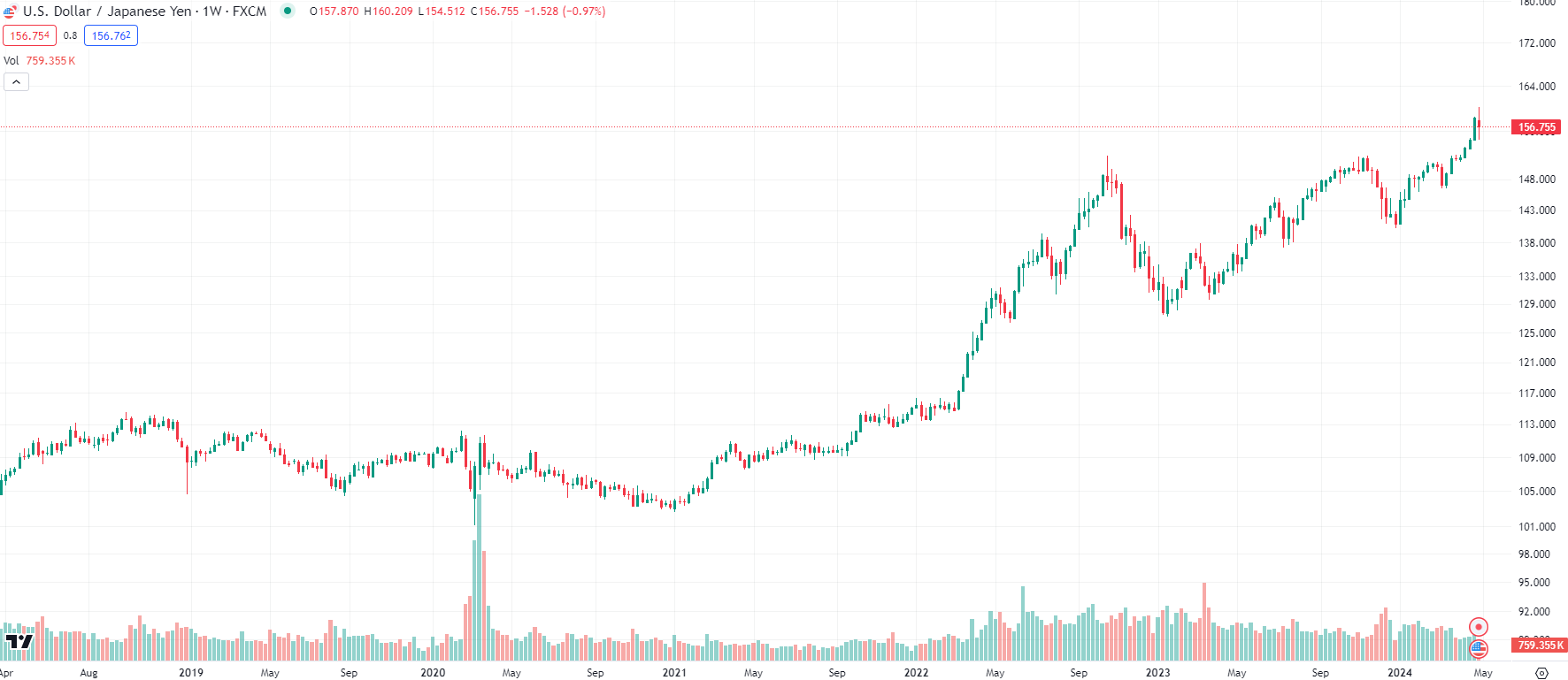Is there another Asian financial crisis brewing? How would stocks be impacted?

Is there another Asian financial crisis brewing? There is increasing concern there might be as many Asian countries’ currencies struggle against the US dollar, particularly Japan, which has reportedly intervened in the market following the yen reaching its weakest level against the greenback since 1990.

USD/JPY log scale (Source: TradingView)
Let’s take a look at whether or not another financial crisis in Asia could happen and how stocks might be impacted. But first, we thought we would recap what happened in the first Asian financial crisis, so all our readers know what we are talking about.
What was the Asian financial crisis?
The Asian financial crisis erupted in 1997, caused by several economic factors, including high levels of foreign debt that were vulnerable to devaluing of the currencies, excessive overinvestment leading to asset bubbles, a lack of financial regulation and the fixed exchange rate systems that led many countries’ currencies to be more expensive and less competitive.
The crisis began in July 1997 when Thailand was forced to float the Thai baht after failing to defend its peg against the US dollar, leading to a rapid devaluation. The baht’s collapse triggered a financial panic and massive withdrawals of foreign capital. The crisis quickly spread to other Asian countries, including Indonesia, South Korea and Malaysia. Currencies plummeted, stock markets crashed and private debts became unsustainable as the value of domestic currencies dropped sharply against the US dollar. The International Monetary Fund (IMF) stepped in to stabilize the economies by providing bailout packages. However, these came with stringent conditions, such as fiscal austerity and structural reforms, which were controversial and had mixed results.
Is history repeating here?
It is too early to tell, although it is a telling point that Japan has seemingly intervened, seeing its currency at a 34-year low, at 160 yen per US dollar. It is important to note that one difference here is that Japan has not lifted interest rates to the extent other countries have, particularly the US, and this is likely a cause of the depreciating currency, not to mention America’s higher investments. Others are that there is more regulation, exchanges are floating and there are no asset bubbles across Asia.
Yet, many countries’ currencies are weak versus the US dollar, particularly Japan as well as Indonesia. The latter nation actually as lifted rates and they are at 6.25%, but it is a warning sign that interest rates cannot help it maintain a depreciating currency and stop capital outflows. Looking at the Philippines and Thailand, they have lifted rates, but are delaying cuts to avoid destabilising their currencies.
What would be the impact of another Asian financial crisis?
Similar effects to what happened last time, inevitably. Economic output could well decline. Consider that Indonesia and Thailand saw their GDPs contract by 13.1% and 10.5%, respectively, in 1998. Now, we don’t expect that sharp a decline, but any sort of decline would be bad news. There would be widespread social and political unrest. In Japan, they turf through PMs often enough that a change would not be a big deal. But in other countries where leaders serve for longer, it could be a bigger deal. In Indonesia, the crisis contributed to the fall of President Suharto in 1998.
Financial reforms could be in the cards
Any crisis may lead to significant reforms aimed at improving financial regulation and corporate governance. The Asian Financial Crisis was a turning point for many economies in the region, prompting sweeping changes in economic policies and financial practices. It also served as a cautionary tale about the dangers of excessive foreign debt and inadequate financial regulation.
Another Asian crisis would have an impact on the ASX
What would this mean for stocks? For US stocks, they may just brush off any impact given the strength of the US economy. As for ASX stocks, it is hard to tell. If the Aussie dollar remains strong compared to Asian currencies, companies that export may derive a benefit. However, a widespread market correction throughout South East Asian markets could occur, and it is unlikely the ASX would be completely spared.
What are the Best ASX Stocks to invest in right now?
Check our buy/sell tips

Blog Categories
Get the Latest Insider Trades on ASX!
Recent Posts
Lindian (ASX: LIN) Jumps 23% on Kazakhstan Rare Earth Deal – Still a Buy After 310% Rally?
Lindian jumps on Kazakhstan rare earth deal- what comes next? Lindian Resources (ASX: LIN) surged 23 per cent to close…
St George Mining (ASX:SGQ) 75% Resource Upgrade, Stock Down 15%, Why?
St George Mining Hits 70.9Mt, The Market Still Wants Confidence St George Mining announced a major resource upgrade at its…
Oil Supply Risk Rises After Iran Drone Attacks Reach Ras Tanura and UK Base in Cyprus
From Battlefield to Oil Chain, Drone Attacks Expand the Conflict Map A British military base at Akrotiri in Cyprus and…


